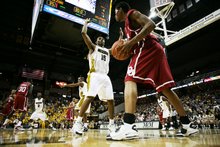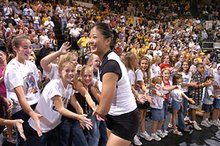You may not know this about me, but I enjoy the occasional What If Game.
Okay, now that you’ve digested that thoroughly unfathomable statement, I’ll mention what a What If thrill it was reading Filip Bondy’s Tip-Off: How the 1984 NBA Draft Changed Basketball Forever. It really doesn’t break too much new ground overall (though I didn’t know about the potential Sampson-for-Jordan trade in the works or how the Mavs sort of got strong-armed out of a coin-flip for Jordan), but it’s a fast and easy read, and as I noted...for fans of the What If Game, it leads your imagination in some pretty fun places.
The first two-thirds of Tip-Off are focused on all the minor details that went into setting the specific draft order that resulted in Houston getting #1, Portland #2, et cetera. He establishes this though character profiles of the guys who actually went #1, 2, 3. It's a pretty easy trick, but it's well-executed.
Like Boston and Memphis (among others) this year, Houston was accused of tanking down the stretch to get a better draft position (playing anicent star Elvin Hayes 53 minutes in one game near the end of the season). Meanwhile, Indiana (whose pick was owned by Portland), Chicago, and Cleveland (whose pick was owned by Dallas and whose ownership and management were so bad in the early-‘80s that David Stern decided to give them an extra first round pick if a new buyer would come into the picture) finished just two games apart. Also, the San Diego Clippers didn’t own their own pick (it was in Philly’s hands) and—possibly because of this—didn’t slack off down the stretch, improving their record and hurting their draft standing. Philly absolutely loved Michael Jordan (eventually making numerous offers to Chicago for their #3), but instead of getting the #2 or 3 pick like they thought they’d get earlier in the season, they fell to #5 and had to ‘settle’ for Charles Barkley.
It's hard to tell how well-written this part is simply because the story basically tells itself (though I can say with absolute certainty that he does a better job of telling the story than I did in that last paragraph). You don't need great literary prowess to make this readable, though Bondy deserves credit for realizing this and not blowing things out of proportion. He doesn't take the Joss Stone approach--showing off all your skills in every song even when totally unnecessary...and therefore ruining something simple and solid--and that's good. His tone is measured and straight-forward. There are a few minor editing errors throughout the book--it could have benefited from better editing--but not enough to discredit the writing as a whole.
So Bondy establishes the characters and does a relatively amusing play-by-play of the draft broadcast (let's just say things have changed slightly in the last 23 years). Before moving on to the last third of the book--what happened after 1984--he does all the What If'ers a favor by summarizing a lot of the What If’s on one page (pg. 180), and I hope I don’t get in trouble for blurbing this:
1. If Portland had won the coin flip, the Blazers planned to choose Olajuwon while the Rockets would have taken Jordan at the number 2 spot to complement Sampson.The What If’iness doesn’t stop with 1984, however. Tip-Off is full of little blurbs about previous drafs and scenarios—Rod Thorn and Chicago lost a coin flip in 1979 that would have resulted in the Bulls drafting Magic Johnson, for example; and hell, for that matter, the only reason the Lakers were involved in that coin flip was that they hade traded Gail Goodrich to the New Orleans Jazz in 1976 for a then-future #1.
2. If the Rockets had offered a deal sending Ralph Sampson to Chicago, the Bulls were willing to trade away their #3 pick.
3. If the Cavaliers had just lost one more game during the regular season, or if the Bulls had won one more, the two teams would have finished in a tie. A coin flip might have awarded the #3 pick to the Dallas Mavericks, who owned Cleveland’s draft choice.
4. If Sam Bowie’s frail legs had failed a physical exam with Portland, the Blazers would have settled on Jordan.
5. If Bowie had come out after his sophomore year, when his mother hung up the phone on that notion, the Blazers would have tabbed Jordan.
6. If the Rockets had grabbed local hero Clyde Drexler in the 1983 draft with their second pick, number 3 overall in the first round, then Portland would not have been able to choose Drexler much lower at #14. Without Drexler, the Blazers would have lacked a young shooting guard and would have picked Jordan in 1984.
7. If Jonathan Kovler, the Bulls’ chief operating officer, had insisted on accepting Harold Katz’s offer of the established, aging superstar, Julius Erving, then Thorn might not have been able to retain the #3 pick.
The book's full of fun stuff like that. Granted, this really is an easy topic—I mean, how freaking fantastic was the talent level here? It’s hard to imagine that one class produced FOUR of the all-time Top 50 players—Hakeem, Jordan, Barkley, and Stockton—along with all-stars like Alvin Robertson and Otis Thorpe and other strong players like Ageless Kevin Willis, Sam Perkins, and Jerome Kersey...and yes, Sam Bowie. But easy topic or no, there really hadn't been a solid, in-depth look at this draft, and Bondy fills the void nicely.






|